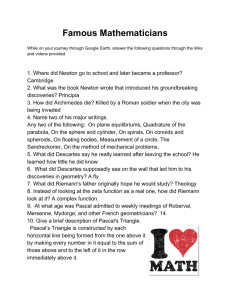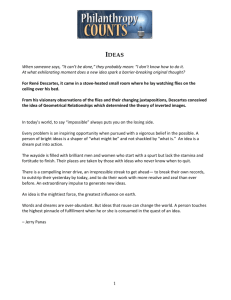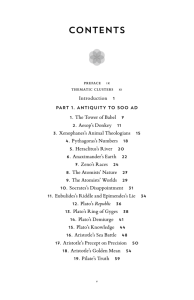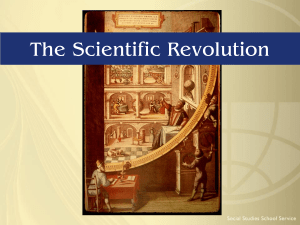Challenges in Physical Education and sports
advertisement
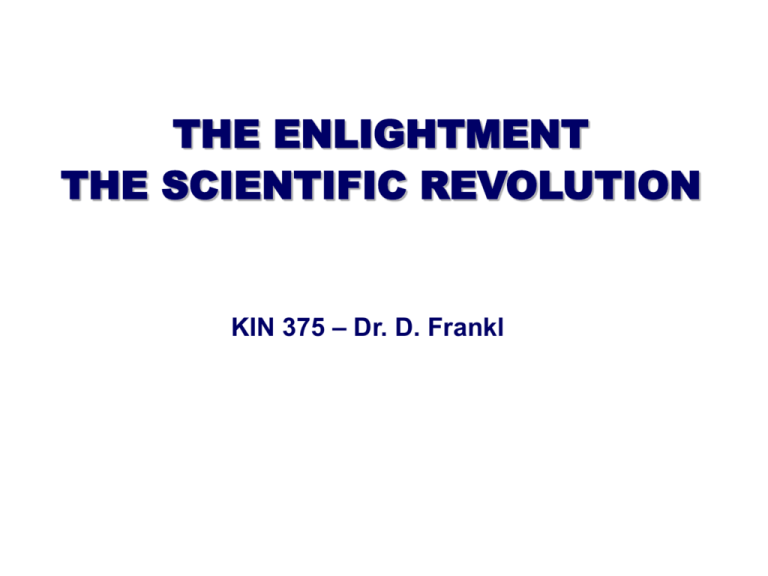
THE ENLIGHTMENT THE SCIENTIFIC REVOLUTION KIN 375 – Dr. D. Frankl 17th Century: A New Era of Scientific Pursuit • The 1700 are labeled as the age of the enlightenment, a time of culmination and a new beginning. Old institutionalized traditions were rapidly making room to new ways of thinking thus setting the stage for massive future change. Diderot 17th Century: A New Era of Scientific Pursuit • 1543 Works by Archimedes recovered in the West • 17th Century scientists held that though universe was made by God, it was explicable by rational analysis • emphasis on complex reasoning was rejected in favor of a closer examination of physical facts http://www.angelfire.com/mo/christian22/history5.html 17th Century: A New Era of Scientific Pursuit • Scientific instruments made available with the advancement of European technology • Scientists rebelled against authority and sough out new explanations of natural phenomena. They focused on measurable quantities and any relationships between them. http://www.angelfire.com/mo/christian22/history5.html (Feb. 16, 2003) 17th Century: A New Era of Scientific Pursuit • Prince Federico Cesi, founder of the Accademia dei Lincei, in 1611 suggested calling this instrument "telescopio"[from the Greek tele (far) and scopeo (I see)]. http://galileo.imss.firenze.it/news/cielimedicei/01/estrumento2.html 17th Century Personalities • • • • • Descartes Pascal Bacon Bayle Newton • • • • • Montesquieu Voltaire Diderot Rousseau Locke René Descartes (1596-1650) http://www.iep.utm.edu/d/descarte.htm • One of the most important Western philosophers of the past few centuries. • Was just as famous as an original physicist, physiologist and mathematician. René Descartes René Descartes (1596-1650) • Educated from age 8 at a Jesuit college. • Studied classics, logic and traditional Aristotelian philosophy • In 1618 he studied mathematics and mechanics under the Dutch scientist Isaac Beeckman. René Descartes http://www-groups.dcs.st-and.ac.uk/~history/ Mathematicians/Descartes.html René Descartes (1596-1650) • Descartes held the position that only mathematics is certain and therefore all knowledge must be based on mathematics. • Falsely claimed no influence of others on his work. • Principia Philosophiae (1644) attempts to place the whole universe on a mathematical foundation reducing the study of the universe to one of mechanics. René Descartes (1596-1650) http://www.iep.utm.edu/d/descarte.htm • Descartes rejected the Aristotelian and Scholastic traditions that had dominated philosophical thought throughout the Medieval period. • In his revolutionary attempt to fully integrate philosophy with the "new" sciences, Descartes changed the relationship between philosophy and theology. René Descartes (Quotes) http://www-groups.dcs.st-and.ac.uk/~history/Quotations/Descartes.html • Cogito Ergo Sum. "I think, therefore I am.“ (Discours de la Méthode) • “It is very certain that, when it is not in our power to determine what is true, we ought to act according to what is most probable.” (Discours de la Méthode) René Descartes (Quotes) http://www-groups.dcs.st-and.ac.uk/~history/Quotations/Descartes.html • Perfect numbers like perfect men are very rare. (Quoted in H. Eves Mathematical Circles Squared – Boston, 1972). • It is not enough to have a good mind. The main thing is to use it well. (Discours de la Méthode) • If you would be a real seeker after truth, you must at least once in your life doubt, as far as possible, all things. (Discours de la Méthode) Blaise Pascal (1623 – 1662) Source: http://en.wikipedia.org/wiki/Blaise_Pascal • A mathematician of the first order, Pascal’s treatise on the subject of projective geometry and contribution to probability theory, has had a strong influence on the development of modern economics and social science. Blaise Pascal René Descartes Blaise Pascal (Quotes) http://www-groups.dcs.st-and.ac.uk/~history/Mathematicians/Pascal.html • Our nature consists in movement; absolute rest is death. -- Pensées (1670) • It is the heart which perceives God and not the reason. -- Pensées (1670) • We arrive at truth, not by reason only, but also by the heart. -- Pensées (1670) René Descartes • The more I see of men, the better I like my dog. – H. Eves Return to Mathematical Circles (Boston, 1988). Blaise Pascal (Quotes) http://www-groups.dcs.st-and.ac.uk/~history/Mathematicians/Pascal.html • Let no one say that I have said nothing new... the arrangement of the subject is new. When we play tennis, we both play with the same ball, but one of us places it better. -- Pensées (1670) • Reason is the slow and tortuous method by which these who do not know the truth discover it. The heart has its own reason which reason does not know. -- Pensées (1670) Baron de Montesquieu (1689-1755) http://www.rjgeib.com/thoughts/montesquieu/montesquieu-bio.html • Born as Charles Louis de Secondat to a noble and prosperous family. • Studied science and history at the Oratorian Collège de Juilly. • Earned a law degree from the University of Bordeaux in 1708 • Upon his death in 1716, Baron de Montesquieu, left his fortune, his office as president of the Bordeaux Parliament, and his title of Baron de Montesquieu to his nephew de Secondat. Baron de Montesquieu (1689-1755) http://www.rjgeib.com/thoughts/montesquieu/montesquieu-bio.html • Montesquieu believed that a government that was elected by the people was the best form of government. • His ideas about separation of powers became the basis for the United States Constitution. • Commerce, according to Montesquieu, is an activity that cannot be confined or controlled by any individual government or monarch. Baron de Montesquieu (1689-1755) http://plato.stanford.edu/entries/montesquieu/ • According to Montesquieu, the civil laws are not an appropriate tool for enforcing religious norms of conduct: God has His own laws, and He is quite capable of enforcing them without our assistance. When we attempt to enforce God's laws for Him, or to cast ourselves as His protectors, we make our religion an instrument of fanaticism and oppression; this is a service neither to God nor to our country. Francis Bacon (1561-1626) • The son of Nicolas Bacon, the Lord Keeper of the Seal of Elisabeth I. Bacon described his tutors at Trinity College Cambridge as "Men of sharp wits, shut up in their cells of a few authors, chiefly Aristotle, their Dictator." This is likely the beginning of Bacon's rejection of Aristotelianism and Scholasticism and the new Renaissance Humanism. http://oregonstate.edu/instruct/phl302/ philosophers/bacon.html(2-16-03) Francis Bacon (1561-1626) • Natural knowledge, according to Bacon, must be reconceptualized as a cumulative process of discovery, propelled by processing sensory data about the external world through the reasoning powers of the human brain. http://www.findarticles.com/p/articles/mi_m1134/ is_5_108/ai_54830693 Francis Bacon (1561-1626) • “Books must follow sciences, and not sciences books.” • “Knowledge is power” • Reading maketh a full man, conference a ready man, and writing an exact man. • “Some books are to be tasted, others to be swallowed, and some few to be chewed and digested.” http://www.bartleby.com/100/139.html (2-16-03) Francis Bacon (1561-1626) • “I had rather believe all the fables in the legends and the Talmud and the Alcoran, than that this universal frame is without a mind.” • “No pleasure is comparable to the standing upon the vantage-ground of truth.” http://www.luminarium.org/sevenlit/bacon/quotes.php Voltaire’s View on the New Trends • Man is the owner of his own mind • Man is capable of goodness and progress • One can uncover the reason behind events and can explain the principles that govern nature, man and society • Questioning and criticism of authority • broad solidarity of enlightened intellectuals • Strong aversion toward nationalism Source: http://mars.wnec.edu/~grempel/ courses/wc2/lectures/enlightenment.html (2-16-03) Pierre Bayle (1647-1706) http://plato.stanford.edu/entries/bayle/ • A Huguenot, i.e., a French Protestant, who spent almost the whole of his productive life as a refugee in Holland. • His volumes of works include history, literary criticism, theology, obscenity, and much more, in addition to philosophical treatments of toleration, the problem of evil, epistemological questions, and much more. Pierre Bayle (1647-1706) http://en.wikipedia.org/wiki/Pierre_Bayle • Pierre Bayle was a progressive Christian scholar who argued that faith could not be justified by reason, on the grounds that God is incomprehensible to man. • Although Bayle's intent was to turn people against reason in matters of faith, he was so thorough in debunking the reasonableness and coherency of religion that his works subsequently influenced the development of the Enlightenment Jean-Jacques Rousseau (June 28, 1712 – July 2, 1778) In his treatise "The Social Contract," Rousseau posits that man was naturally good but is corrupted by the influence of society and its institutions. “Man is born free, and everywhere he is in chains. “ “Everything is good as it leaves the hands of the author of things, everything degenerates in the hands of man.” Rousseau's influence both in art and politics was huge in his own day and continues to be strong today. http://www.rjgeib.com/thoughts/rousseau/rousseau.html Jean-Jacques Rousseau (June 28, 1712 – July 2, 1778) • “All wickedness comes from weakness. . . . Make • • • • [the child] strong and he will be good.” “The training of the body, though much neglected, is… the most important part of education.” “Childhood has its ways of seeing, thinking, and feeling that are proper to it.” “There is no original perversity in the human heart.” “Put questions within [the child's] reach and let him solve them himself. Let him know nothing because you have told him, but because he has learned it for himself .” • “It is in doing good that we become good.” Rousseau’s view on the relationship between body and mind -- • “It is a lamentable mistake to imagine that bodily activity hinders the working of the mind, as if these two kinds of activity ought not to advance hand in hand, and as if the one were not intended to act as guide to the other…to learn to think we must therefore exercise our limbs, our senses, and our bodily organs, which are tools of the intellect; and to get the best use out of these tools, the body which supplies us with them must be strong and healthy.” Immanuel Kant (1724-1804) • “God and divine creation cannot be part of any truly scientific theory because both involve "unconditioned" realities, while science can only deal with conditioned realities -- in the world, everything affects everything else, but the traditional view, found even in Spinoza, is that God is free of any external causal influences.” http://www.friesian.com/kant.htm by Kelley L. Ross, Ph.D. (2000) Kant's Categorical Imperative The supreme principle of morality is a categorical imperative since it is not conditional upon one’s preferences. Analytic propositions: propositions that are true by definition, such as "All wives are women." Synthetic propositions: propositions that are not true by definition, such as "Jones is bald." Kant's Categorical Imperative The supreme principle of morality is a categorical imperative since it is not conditional upon one’s preferences. A posteriori knowledge: knowledge attained through the five senses, such as the fact that the door is brown. A priori knowledge: intuitive knowledge attained without use of the senses, such as 2+2=4. Kant's Categorical Imperative • Kant presents the single categorical imperative of morality: act only on that maxim by which you can at the same time will that it should become a universal law. Although there is only one categorical imperative, Kant argues that there can be four formulations of this principle. • Kant’s point is that the categorical imperative involves a unique type of knowledge that is intuitive, yet informative. Kant's Categorical Imperative (b) • The Formula of the Law of Nature: "Act as if the maxim of your action were to become through your will a universal law of nature." • The Formula of the End Itself: "Act in such a way that you always treat humanity, whether in your own person or in the person of any other, never simply as a means, but always at the same time as an end." Kant's Categorical Imperative (c) • The Formula of Autonomy: "So act that your will can regard itself at the same time as making universal law through its maxims." • The Formula of the Kingdom of Ends: "So act as if you were through your maxims a lawmaking member of a kingdom of ends."


